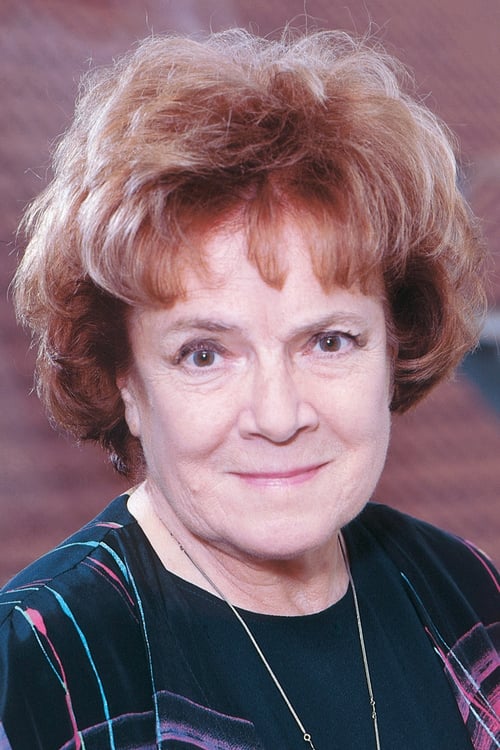
|
Veliká příležitost (1950)
Character: Lída Kolářová
An optimistic collective drama from the life of the workers on the construction site of the Youth Track. An amnestied prisoner wants to atone for his wrongdoing with an honest strike and reveals the vandal who was going to poison the drinking water cistern.
|
|

|
Co dělat? (Cesta z Prahy do Českého Krumlova aneb Jak jsem sestavoval novou vládu) (1996)
Character: Self
Quite a few years have passed since November 1989. Czechoslovakia has been divided up and, in the Czech Republic, Václav Klaus’s right-wing government is in power. Karel Vachek follows on from his film New Hyperion, thus continuing his series of comprehensive film documentaries in which he maps out Czech society and its real and imagined elites in his own unique way.
|
|

|
A znovu Žebrácká opera (1996)
Character: Self
Two different productions of Václav Havel's Beggar's Opera reveal the political dynamics of Czechoslovakia before and after the velvet revolution.
|
|

|
Romanetto (1970)
Character: N/A
A young woman from an old patrician family in Prague collapses and is institutionalized in a psychic ward. The non-linear narration unveils here fortunes one by one. The prose of Jakub Arbes is the basis for this experimental film poem. The storyline is uncovered in a mosaic of pictures in a purely visual form, without a single word.
|
|

|
Odcházení (2011)
Character: grandmother
A bitter sweet comedy that follows a highly appointed Chancellor who set to step down from his position after years of service to his country. With just two last days left to enjoy his palatial villa before he is finally evicted, his situation gradually goes from bad to worse.
|
|

|
Nový Hyperion aneb Volnost, rovnost, bratrství (1992)
Character: Herself
From the behavior, discourse, and appearance of individual actors, Vachek composes, in the form of a mosaic, a broad and many-layered film-argument about Czechoslovak democracy in the period of its rebirth, all administered with the director’s inimitable point of view.
|
|

|
Maratón (1968)
Character: N/A
It is 5 May 1945 and the uprising against the hated German occupiers has broken out in Prague. The Czech guards open the gate of the Pankrác prison to allow the prisoners to escape en masse. Many of them are shot dead by the German guards but young Ruda (Jaromír Hanzlík) manages to run away. He is taken care of by one of the Prague fighters, concierge Kytka. Kytka hides him in the flat of the house's owner where only the young maid Karla (Jana Brejchová) is left, ordering her to take care of Ruda.
|
|

|
Škola otců (1957)
Character: Pelikánová
A new teacher with high standards and a strong sense of duty replaces an easy grader. Once bad grades begin to pile up, a product of his predecessor's subservience to the system, the new teacher has to stand up for himself and his students.
|
|

|
Třicet panen a Pythagoras (1977)
Character: Helena's Mother (voice)
A musical starring Jiří Menzel (whose part is sung by Achilles Michailidis) as a math and physics teacher employing innovative teaching methods.
|
|

|
Je třeba zabít Sekala (1998)
Character: Marie
ComiBaran, a protestant blacksmith arrives in the little village of Lakotice to kill Sekal, a cruel Nazi collaborator.
|
|

|
Až přijde kocour (1963)
Character: Marjánka
While old Oliva tells a group of children about his life as a sailor and how he met Diana and her cat with sunglasses, a strange circus arrives in town.
|
|

|
Spalovač mrtvol (1969)
Character: Lakmé / Dagmar
In 1930s Prague, a Czech cremator who firmly believes cremation relieves one from earthly suffering is drawn inexorably to Nazism.
|
|

|
Akce B (1952)
Character: Ofélie
Film shows the struggle of the Czechoslovak armed forces against groups of Ukrainian Insurgent Army (UPA) under command Burlak, who tried to pass through the territory of Slovakia.
|
|

|
Bílá paní (1965)
Character: Anežka, Pupencova žena
This castle has its own ghost - a mysterious White lady. She emerges from the painting on the wall when someone speaks out magic formula. White lady is good ghost, she can make someone's wishes true. Even if it is a new duct. But a miracle is not the thing that Communist leaders want in the town.
|
|

|
Past (1950)
Character: Ruzena
The Trap (Czech: Past) is a 1950 Czech drama film directed by Martin Frič. It was entered into the 1951 Cannes Film Festival.
|
|

|
Honzíkova cesta (1957)
Character: Tichá, Honzík's mother
Five years old Johnny is going for his first journey with no parents.
|
|











